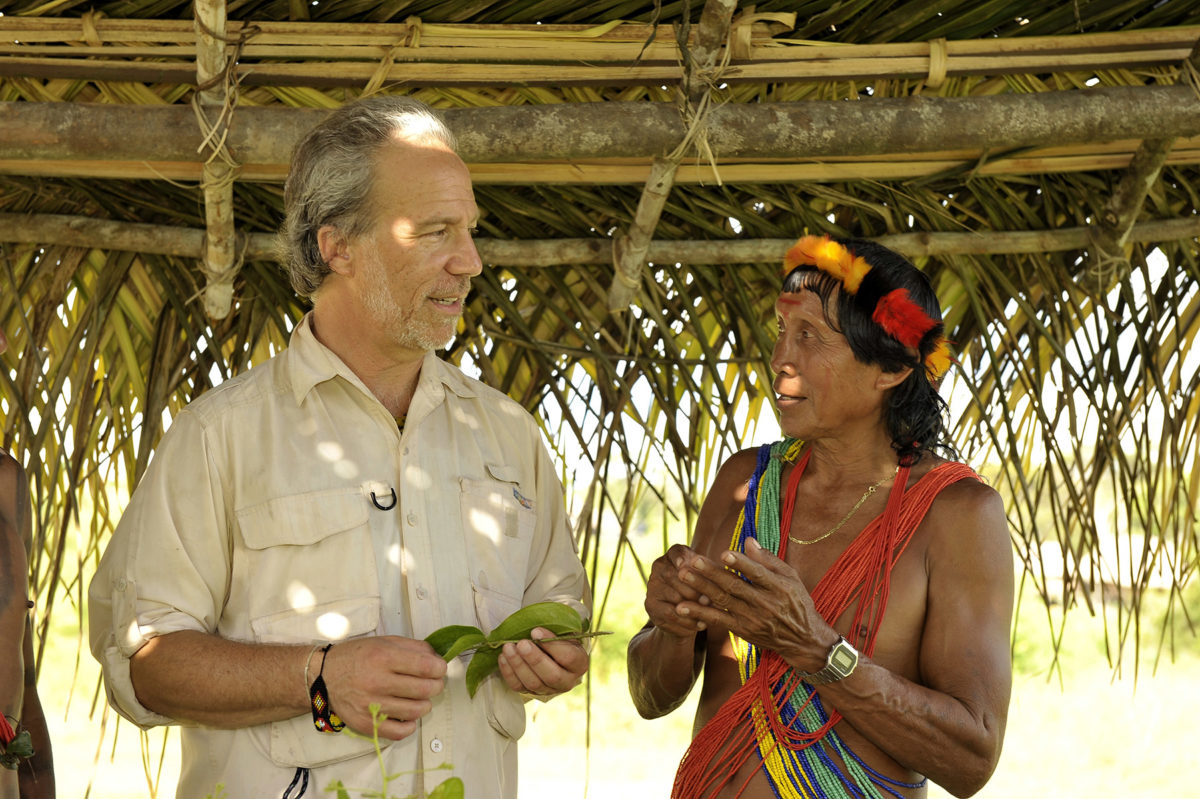As a best-selling author, the co-founder of the award-winning Amazon Conservation Team, and an acclaimed public speaker, Mark Plotkin is one of the world’s most prominent rainforest ethnobotanists and conservationists. Plotkin has worked closely with Indigenous communities–including traditional healers or shamans–since the 1980s, first as an academic, then as a member of a large conservation organization.
His experiences in Amazonian communities led Plotkin, along with Costa Rican conservationist Liliana Madrigal, to establish the Amazon Conservation Team (ACT) in 1995. ACT took a distinctly different approach than most Western conservation groups at the time: It placed Indigenous communities at the center of its strategy, working in deep and sustained partnerships with Indigenous elders and leaders to strengthen recognition of their rights through a combination of traditional knowledge and mapping technologies. These efforts have resulted in vast swathes of Indigenous territories across rainforests in Colombia, Suriname, and Brazil securing better protection, both functionally and legally. They have also helped elevate the public’s consciousness about the value and importance of traditional Indigenous knowledge.

ACT’s approach has since been widely adopted by other organizations, and its philosophy as a whole is now more relevant than ever as the conservation sector wrestles with its colonial roots and the associated issues around discrimination, inclusion, and representation. Put another way, ACT’s longtime model has gone from being seen as fringe to being mainstream.
Plotkin welcomes these developments, but cautions that it will take more than lip-service and money to drive meaningful shifts in how conservation groups work with Indigenous communities.
“Claiming you are going to do something difficult and then carrying it out successfully are not the same thing,” Plotkin told Mongabay during a January 2022 interview. “In my experience, partnering effectively with tribal colleagues and communities does not happen on a western timeline and is certainly not expedited by simply throwing lots of money at the process.”

Plotkin has been working to broaden public interest in Indigenous cultures and knowledge through a variety of platforms, from books to speeches to films, as a way to create a stronger constituency for Indigenous-led conservation. Last year he launched a podcast, “Plants of the Gods: Hallucinogens, Healing, Culture and Conservation”, to reach new audiences with this message.
Plotkin says that the podcast’s emphasis on medicinal plants, especially hallucinogenic plants, serves a purpose.
“I believe that hallucinogens and shamanism represent some of the most important ‘connective tissue’ between tropical nature and human well-being,” Plotkin told Mongabay.

As with his books, Plotkin leverages his storytelling abilities to engage his audience. These skills, he says, are critical to maximizing your effectiveness, whether that’s as a conservationist or something else.
“I have spent much of my career working with Indigenous peoples where… storytelling represents an essential craft,” he said.
“Our industrialized society and our educational system have long undervalued the importance of telling an effective story. Whether you are a prosecutor trying to convince a jury, or a fundraiser trying to convince a donor, or a conservationist trying to convince a government official, you must be able to convey the information in a clear and compelling manner.”
Plotkin spoke of his work, trends in conservation, and a range of other topics in a January 2022 exchange with Mongabay founder Rhett A. Butler.

